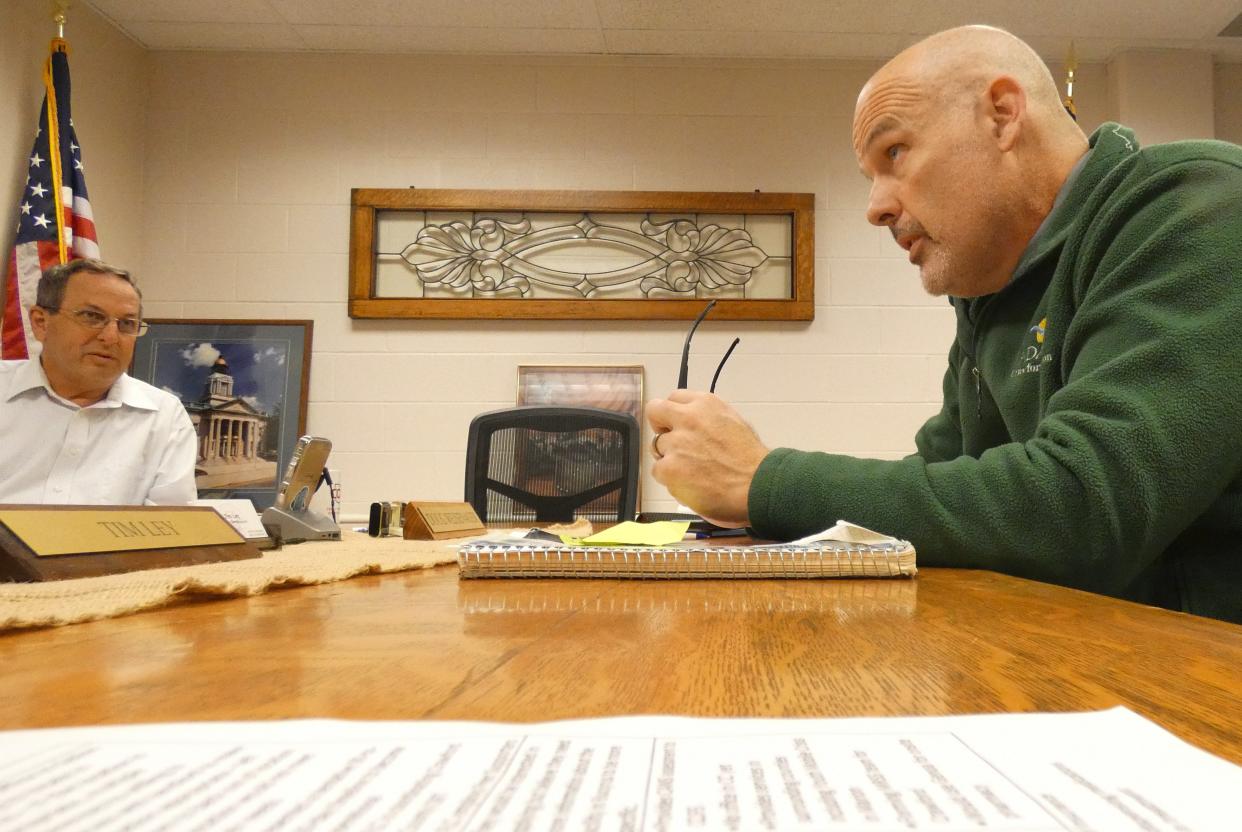Opioid settlement: Crawford County commissioners developing plans for treatment center

While they wait for the county's share of money from Ohio's settlement with painkiller manufacturers and distributors, county commissioners are making plans for how to put the funding to good use.
"We're trying to use our funding to secure a facility for a treatment center, because people who need the treatment in Bucyrus, they can't travel to Sandusky for treatment. .. I think every county needs a treatment center, so we're trying to work through that process," said Doug Weisenauer, commission president, during a meeting last week with Brad DeCamp, executive director of the Crawford-Marion Board of Alcohol, Drug Addiction and Mental Health Services.
The idea would be to have one building housing multiple agencies providing services needed to combat drug addiction in the county, Weisenauer explained. The ADAMH Board would have an office in the building, too.
Strategies for using the funding must provide for prevention, treatment and recovery services, DeCamp said.
New Salvation Army building part of plan
Conditions for the use of the settlement funding allow county governments to work with nonprofits, including religiously based organizations, so county leaders reached out to the Salvation Army to handle the prevention part of the equation, Weisenauer said.
"They want to do after-school tutoring and things like that," he said. "So I think if we can secure a facility, we can have multiple uses in that facility. We're still working and trying to find a spot."
Who would own the building is still be worked out, Weisenauer said Tuesday. The Salvation Army "desperately" needs a new building, he noted; its current home at 224 E. Rensselaer St. isn't fully handicapped accessible. Having it lease-to-own the structure is one option.
"There's a lot of different ways to do it, but we haven't decided on anything yet," he said.
During the meeting Thursday, DeCamp presented results of a Request for Information from potential treatment providers.
"There's still a lot of unknowns as far as what the funding's going to be, what the approach is going to be like at both the local — the county — level and the regional level as well," he said. "But this was to really get some ideas and kind of solicit the information in a nonbinding way, where the county's not obligated to say yeah, we're picking one of these... It also gives the county good information in terms of what different respondents saw as different ways that they might be able to establish a treatment center in the county."
Responses were received from Family Life Counseling and Psychiatric Services, Behavioral Concepts/Surest Path and Coleman Health Services. At DeCamp's recommendation, commissioners will try to meet with representatives of each organization in coming weeks to learn more.
DeCamp: Small counties need services, too
As part of the settlement, 19 regional councils consisting of local elected officials and drug intervention specialists will receive distributions from the foundation to grant more funding to local anti-addiction programs, according to previous T-F reports. Funding will flow both directly to counties and to the regions. Crawford County is the third-smallest of seven counties in Region 17, which also includes Hancock, Hardin, Ottawa, Sandusky, Seneca, Wood and Wyandot counties.
Payments will be made over a prolonged period, DeCamp said — at least 18 years.
"I think my concern is just making sure that the smaller counties have the same opportunity to benefit from it as the bigger counties do," he said.
"Because we have just as big a problem," Commissioner Larry Schmidt said.
Per capita, they're sometimes even worse, DeCamp added.
Commissioners are still working out details for their plans.
"Even if we have a location in Bucyrus, people in Galion or Crestline, they would have trouble getting here to Bucyrus," Weisenauer noted.
"We do have SCAT, which could transport these people from Galion or Crestline — or outlying areas, if they don't have a car — to a treatment facility in Bucyrus," noted Commissioner Tim Ley, referring to Seneca-Crawford Area Transportation.
Nothing is settled yet, Weisenauer stressed. The county is still waiting to know for sure when it will receive the money, or exactly how much it will receive.
"We've been told by the attorney general's office last fall that the funding would be coming to the county in the fall, and then we were told, 'You'll have it by March.' And now it's 'Maybe by June,'" he said. "I don't think anybody has a clue when the funding's going to start coming through or even how much it's going to be."
419-559-7263
This article originally appeared on Bucyrus Telegraph-Forum: Commissioners: Opioid settlement money could fund treatment center

